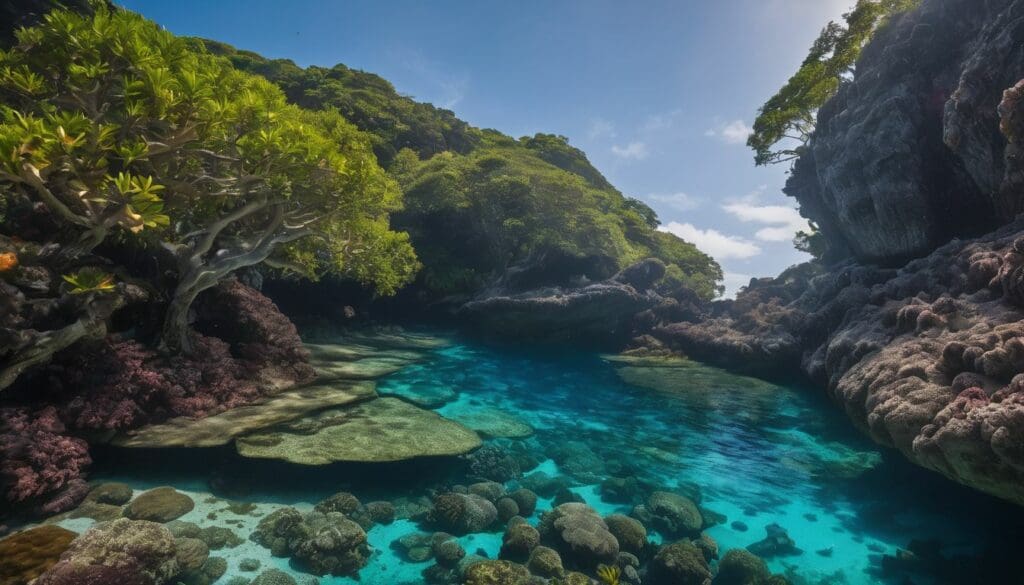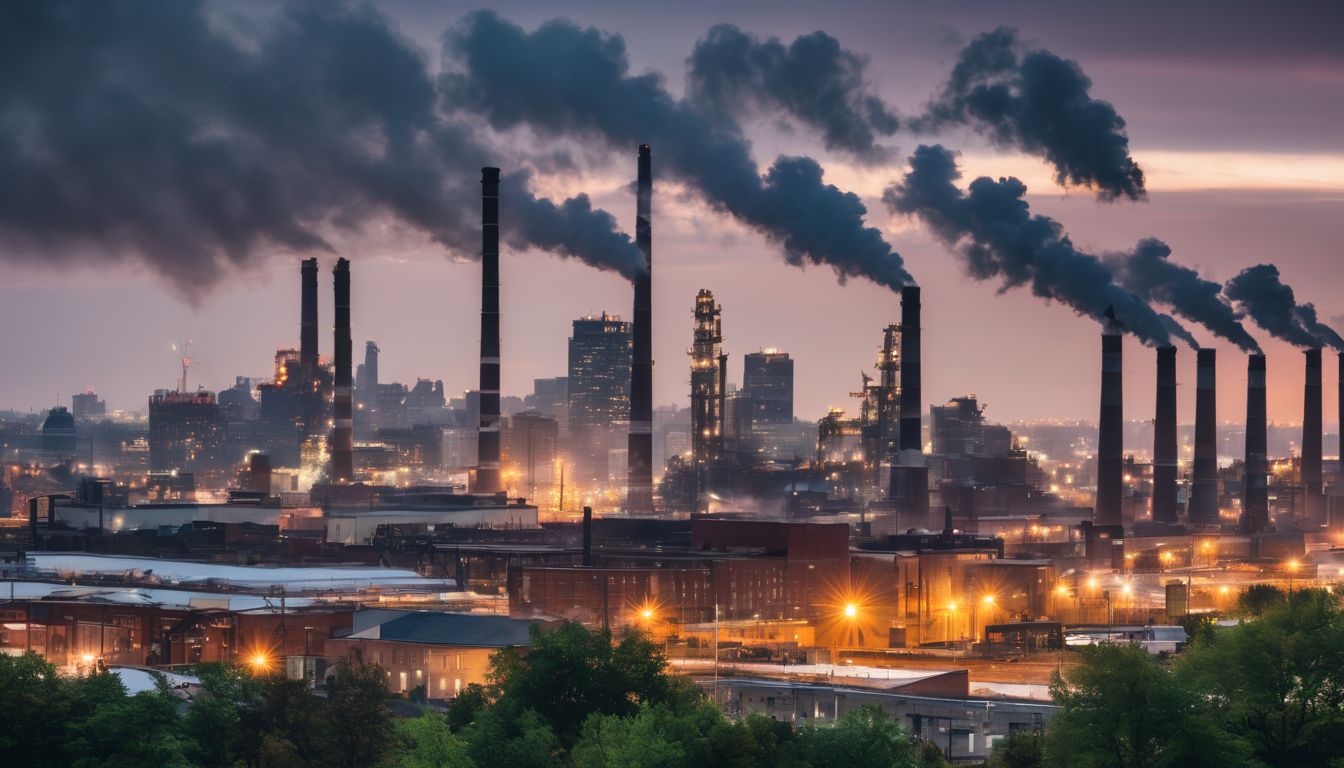Coral reefs around the world are in trouble, and you’re probably wondering why. These underwater rainforests are suffering because the sea is getting warmer. Our article explains how global warming affects these precious ecosystems and what we can do to help save them.
Dive in to learn more!
Key Takeaways
- Coral reefs are struggling because of higher sea temperatures and ocean acidification caused by global warming. This leads to coral bleaching, where stressed corals lose algae that feed them.
- Ocean acidification, triggered by excess atmospheric carbon dioxide, harms marine life as it makes it difficult for organisms like corals to build their skeletons.
- Healthy coral reefs offer economic benefits through tourism and fishing industries and play a protective role against coastal storm damage.
- Interventions such as reducing carbon emissions, promoting eco-friendly tourism practices, and actively engaging in coral restoration projects can aid in preserving these ecosystems.
- The Great Barrier Reef has suffered from massive coral bleaching events due to increased water temperatures, putting this vital habitat at risk of extensive damage.
How Global Warming Impacts Coral Reefs
Global warming has severe impacts on coral reefs, causing coral bleaching and ocean acidification. These changes in the environment threaten the survival of marine organisms and disrupt the delicate balance of marine ecosystems.
Coral Bleaching
Coral bleaching happens when corals get stressed by changes in conditions such as temperature, light, or nutrients. They expel the algae that live in their tissues causing them to turn completely white.
Without the colourful algae, the coral loses its major source of food and is more vulnerable to disease.
During marine heatwaves caused by rising sea temperatures, bleaching events are becoming more frequent and severe. The Great Barrier Reef has experienced mass coral bleaching events that have led to significant coral mortality.
Healthy reefs can often recover from a bleaching event if given enough time and ideal conditions, but with ongoing environmental impacts and ocean temperature increase, these ecosystems face an uncertain future.
Ocean Acidification
Ocean acidification occurs when the ocean absorbs excess carbon dioxide from the atmosphere. This leads to a decrease in pH levels, making the water more acidic. The impacts are detrimental to marine life, especially coral reefs and shell-forming organisms like mollusks and some types of plankton.
As the acidity increases, it becomes more challenging for these organisms to build their skeletons or shells, undermining the entire food chain within these ecosystems.
The process also affects the ability of corals to withstand other stressors such as rising sea temperatures and pollution. Algae expulsion is one of the significant consequences of ocean acidification, disrupting the delicate balance that sustains coral reef systems.
The Importance of Coral Reefs
Coral reefs are vital for biodiversity and support a wide variety of marine life. They also act as a natural barrier, protecting coastlines from storms and erosion. The economic benefits of coral reefs, through fisheries and tourism, make them invaluable to local communities.
Biodiversity
Coral reefs support a wide range of marine life, making them one of the most biodiverse ecosystems on the planet. The unique structures provide habitats for countless species of fish, invertebrates, and plants.
Coral reefs contribute to the overall health of our oceans by providing food and shelter for thousands of marine organisms. Their unparalleled biodiversity also holds great potential for scientific research and discovery into new medicines, biotechnology, and ecological knowledge.
A diverse collection of coral species within reef systems promotes resilience to environmental changes – this is crucial especially in facing climate change effects such as ocean acidification and rising sea temperatures.
Protection from Storms
Coral reefs act as natural barriers, helping to reduce the impact of tropical storms and hurricanes on coastal communities. They absorb wave energy, which lessens the force of incoming storm surges and protects shorelines from erosion caused by powerful waves.
The complex structure of coral reefs also dissipates wave energy, reducing damage from flooding and safeguarding coastal habitats against the destructive forces of extreme weather events such as high winds and heavy rainfall.
Additionally, these vibrant ecosystems provide crucial protection for various marine species that seek refuge in the intricate network of coral formations during storms, further contributing to the overall resilience of coastal ecosystems.
Economic Benefits
Coral reefs provide economic benefits to many coastal communities through tourism and fisheries. They attract tourists for diving, snorkeling, and other recreational activities, contributing to local economies.
Additionally, coral reefs support commercial fisheries by providing habitats for fish and shellfish species that are important for food and trade.
The economic benefits of coral reefs highlight the importance of preserving these ecosystems for both nature and human society. As climate change continues to threaten their existence, it is crucial to implement sustainable practices and conservation efforts to protect the valuable contributions of coral reefs.
The Role of Climate Change in Coral Bleaching
Rising ocean temperatures and changes in ocean chemistry due to global warming are the main contributors to coral bleaching. These factors lead to stress on the coral, causing them to expel the algae living in their tissues, leading to bleaching.
Rising Ocean Temperatures
Ocean temperatures are on the rise due to global warming, which poses a significant threat to coral reefs. This increase in water temperature causes stress to the symbiotic algae living within coral tissues, leading to coral bleaching and eventual death of the reef.
The rising ocean temperatures also contribute to changes in local weather patterns and can disrupt the delicate ecological balance that sustains these diverse ecosystems.
Changes in Ocean Chemistry
Global warming has led to changes in ocean chemistry, particularly an increase in carbon dioxide levels. As carbon dioxide is absorbed by the ocean, it undergoes chemical reactions that reduce the pH levels of seawater, a process known as ocean acidification.
This shift in acidity can hinder the ability of marine organisms to build their calcium carbonate shells and skeletons.
Furthermore, the altered chemistry affects the equilibrium of various compounds crucial for marine life. For instance, lower pH levels make it more challenging for corals and other calcifying organisms to maintain their calcium carbonate structures essential for survival.
These changes pose a significant threat to coral reefs, impacting their growth and resilience against environmental stressors.
Solutions to Preserve Coral Reefs
To preserve coral reefs, reducing carbon emissions is essential. Sustainable tourism practices and efforts to restore damaged coral can also contribute to long-term preservation.
Reducing Carbon Emissions
To reduce carbon emissions, we can all play a part by using energy-efficient appliances and vehicles. Lobbying for sustainable practices in industries and supporting renewable energy sources such as wind and solar power also contribute to reducing carbon emissions significantly.
Conserving energy at home and advocating for policies that limit carbon output are effective ways to combat climate change. By taking these steps, we can help mitigate the impact of global warming on coral reefs.
Sustainable Tourism
Transitioning from reducing carbon emissions to sustainable tourism, environmentally conscious individuals play a vital role in minimising their impact on coral reefs. By choosing eco-friendly travel options and supporting responsible tour operators, tourists can help protect delicate reef ecosystems.
Engaging in activities that promote conservation and participating in educational initiatives during visits to coral reef destinations can also contribute to the preservation of these valuable marine environments.
Coral Restoration
Transitioning from sustainable tourism to coral restoration, it’s crucial to highlight the significance of actively participating in coral restoration efforts. By engaging in activities such as reef gardening and outplanting, individuals can play a vital role in rehabilitating damaged coral ecosystems.
These interventions are essential for enhancing the resilience of corals against environmental stressors, contributing to the overall preservation of these valuable marine habitats.
Individuals who care about the environment can get involved in coral restoration projects by supporting organisations dedicated to this cause. Through volunteering or donating to initiatives aimed at restoring coral reefs, one can directly contribute to safeguarding these diverse and ecologically important underwater ecosystems.
Conclusion and Call to Action
The preservation of coral reefs is critical for the planet’s biodiversity. Rising ocean temperatures and changes in ocean chemistry are causing coral bleaching and degradation at an alarming rate.
It is essential to take action now by reducing carbon emissions, promoting sustainable tourism, and investing in coral restoration efforts to protect these vital ecosystems for future generations.
FAQs
1. How does global warming affect coral reefs?
Global warming leads to sea level rise, changes in ocean circulation, and more intense tropical storms, all of which cause significant coral reef degradation.
2. Why is a rise in sea levels bad for coral reefs?
When the sea level rises, it can result in harmful sediment on the reefs and disrupt the delicate balance that corals need to survive.
3. Can warmer oceans from global warming harm corals?
Yes, warmer ocean temperatures from global warming can stress corals and lead to bleaching events where they lose their vibrant colors and ability to thrive.
4. Does global warming increase storm damage to coral reefs?
Indeed, as global warming boosts tropical storm frequency and intensity, this results in stronger waves and currents that can break apart or damage fragile coral structures.





